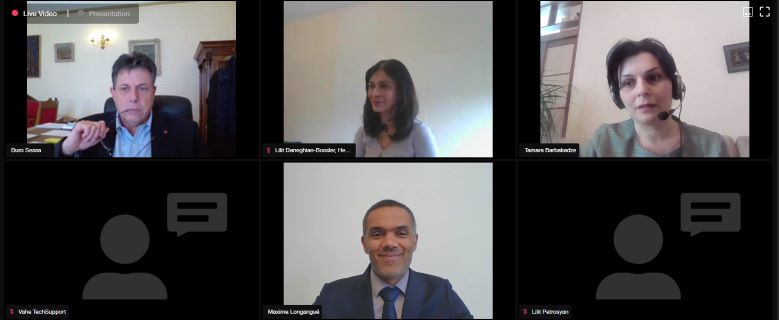On 26 February 2021 an online discussion of the ''Post-adoption review of the Judicial Code of Armenia'' took place within the framework of the Partnership for Good Governance (PGG II) Project ''Support to the judicial reform – enhancing the independence and professionalism of the judiciary in Armenia'' (further – the Project), funded by the European Union and the Council of Europe and implemented by the Council of Europe.
One of the Project components is focused on the assessment of legislation related to the justice system of Armenia and the provision of recommendations as to strengthening the independence, impartiality and efficiency of the judiciary in Armenia, in line with the Council of Europe standards.
In March 2020, following the Joint Opinion CDL-AD(2019)024 of the Venice Commission and the Directorate of Human Rights of the Directorate General of Human Rights and Rule of Law (DGI) of the Council of Europe, the National Assembly of Armenia adopted the Law on Amendments and Addenda to the Judicial Code and 13 related laws, which entered into force in May 2020. In December 2020, the Project initiated a post-adoption review of the amended Judicial Code with the objective to identify to what extent the recommendations provided by the Joint Opinion CDL-AD(2019)024 are incorporated into the amended Judicial Code.
The post-adoption review was conducted by international experts Mr. Gerhard Reissner (former President of the Consultative Council of European Judges) and Mr. Duro Sessa (former President of the Consultative Council of European Judges, the President of the Supreme Court of Croatia). Both experts have been involved broadly in the expert work in many Council of Europe member states, including by various Council of Europe Committees. They were also a part of the group of rapporteurs engaged in providing the Joint Opinion of the Venice Commission CDL-AD(2019)024 in 2019.
The objective of the discussion was to agree with the Armenian stakeholders the preliminary findings and conclusions of the post-adoption review with regard to the Judicial Code. The discussion was attended by the representatives from the Ministry of Justice, the Supreme Judicial Council, the Court of Cassation, the Delegation of the European Union to Armenia. Following the exchange of opinions during the online discussion, the text of the post-adoption review will be finalised with the account of the suggestions and commentaries of the national partners. The final version of the post-adoption review will be disseminated publicly.




